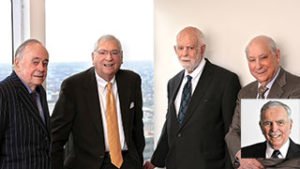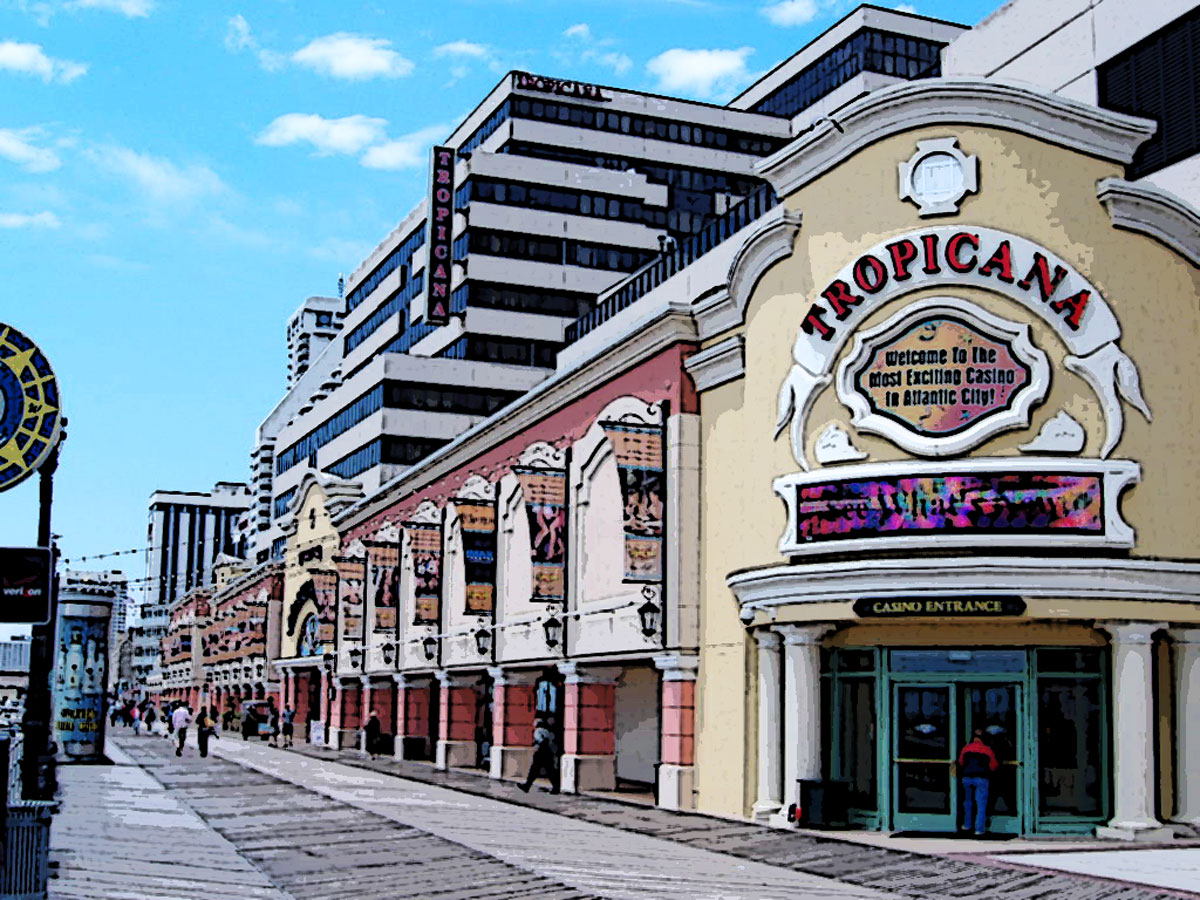 Published in 2016 Pennsylvania Super Lawyers — June 2016
Published in 2016 Pennsylvania Super Lawyers — June 2016
Back then, few people took the LSAT, and Pennsylvania law students needed established “preceptors” to shepherd them through their degrees and early careers. Only a handful of women were in each class. Young attorneys often majored in law and minored in the Korean War. Many married young, started families quickly and established firms to make money any way they could.
Here are the stories of five Pennsylvania attorneys who earned their law degrees in the 1950s and are still practicing.
Munley: I was born and raised in a little coal town 10 miles north of Scranton called Archbald. My great-grandfather came from Ireland. His oldest son after the first World War ran for the legislature and was elected. That was 1922. He continued to be elected until he died in 1938. He was replaced by my father, who was re-elected five times, until 1947, when he died suddenly. My mother replaced him. She was there for 20 years. We had a lifetime association with the law in some form. I decided when I was very young I wanted to be a lawyer, and that’s what happened to me.
Sherr: My father was an employee of the U.S. Postal Service and my mother was a homemaker. I was probably the first in my family to even go to college. So there was no burning desire. I didn’t really know what I wanted to do. I just had some lucky career breaks.
Lacheen: The real reason I wanted to be a lawyer is because my father wanted me to be a doctor. That was my big revolution, basically. I ran away from home to become a lawyer.
For many young, soon-to-be attorneys in the ’50s, the Korean War served as unofficial training. Some were legal officers, defending soldiers; others used the GI Bill to help with home payments and other expenses to help them afford law school; still others breezed through law school after commanding entire companies during wartime.
Munley: I left law school; I gave up my deferment and volunteered to be drafted, and I went to Korea. I thought I’d be in America for a long time. Five months later, I was in the war. I was assigned to an engineer battalion [in the Army in South Korea]. Our assignment was to the airfield—building and repairing and protecting the airfield. I was not in the infantry. I was not [in] combat in the true sense of the word. But we had our problems at night with infiltrators. I got shot at, and I shot back.
Orlow: My first duty station was in the Naval Training Center at Bainbridge, Maryland, where I was both the assistant legal officer and one of the junior staff officers. About a year later, I got transferred to the Naval Legal Office at the Philadelphia Naval shipyard. I started defending and trying courts martial and representing service personnel. I got a lot of trial experience. When I finished my time there, all I had to do was change my blue suit with the stripe on it to my blue suit without a stripe on it.
Harkins: I had commanded a company in the 101st Division, and just the responsibilities and the manner in which one had to relate to sometimes complicated circumstances made it easy to go to law school. I thought law school was fairly easy. We had a higher percentage of veterans than was probably true in subsequent years.
Some attorneys’ families encouraged them to join the profession; others did everything they could to stop them. Preceptors helped them succeed early on.
Lacheen: I did not want to go to Penn. My father insisted. They saw the applications come in, and I got accepted to this school and that school. Nothing came from Penn. He wanted to know why I didn’t get accepted or rejected. He dragged me up to the admissions office. My father’s a pretty forceful person. “Frankly, Mr. Lacheen, we don’t accept people who don’t apply here.” “What do you mean?” “Here’s your son’s application—he applied to Notre Dame, Notre Dame, Notre Dame and Gettysburg.” I ended up at Penn.
Orlow: My father became an attorney, I guess, because when he was going through the University of Pennsylvania as an undergraduate, that’s what appealed to him as a way of servicing the community. He met my mother when he was teaching at Penn and he [might have] convinced her to go to law school. In her class at Penn, I think there were three to five women. My class at Harvard, there were only five women.
Sherr: At that time, you had to perform a six-month clerkship for your preceptor, who had to come in before the board of law examiners and vouch for your scholarship and dedication to the law. There was a meeting you had before you started law school and after you finished law school. Kind of archaic, but that’s the way you had to do it in those days. Most of the time, unless you were lucky, you took on the six-month obligation at practically no pay. I used to meet law school classmates on the street and they were taking preceptors’ shoes to the shoemaker.
Lacheen: My uncle managed to get me in [to the University of Pennsylvania]. I hated the school. I hated the people. I was one hostile, resentful, angry kid, and I completed the first term and passed contracts and torts and never went back. When I was 17, my family took a trip to Florida, and I thought, ‘I’ve got to get away from my parents and the whole environment.’ That was the farthest I could ever conceive of going. … I went to University of Miami School of Law. People thought it was like ‘Sunshine University,’ but it was the farthest thing from ‘Sunshine University’—that may have been the undergraduate school back then, but the law school was all these retired guys from Michigan and Yale. I had a fantastic law school education. I wound up going through law school in three years.
These attorneys didn’t find their practice areas—their practice areas found them.
Lacheen: I got admitted to the Florida bar in September ’57, got sworn in to the Supreme Court and came back to Philly. And my father-in-law had a heart attack—but not because I came back. He had a bankruptcy practice; I stepped in to hold the office together.
Munley: I spent 10 years as an assistant district attorney. The district attorney retired and the Democratic Party picked me to replace him. I lost the election. Now most people will tell you that’s the greatest break I ever got. I spent the aftermath pretty much trying criminal cases. From then on I realized that I could make a living with the law, without anything else.
Orlow: The lawyers in the [military] service were sending me divorces and accident cases and buying and selling houses. They needed me personally and knew I’d give the [client] a straight shot. After a year or so, I was getting enough private practice that the guy I was working for decided I wasn’t giving him enough time to work on his cases. . . . He and I parted company on honorable terms, and he hired somebody else who helped him and I went across town and opened an office next to my mother [who was also an attorney]. That was the spring, and by fall, she got married and moved out and left me with files and a practice, partly immigration. Pretty soon it was all immigration.
Lacheen: When I started a practice, I did whatever everybody else does—accident cases, compensation, work for people who couldn’t afford a lawyer. That began to [spin] off into state criminal work. There was a neighborhood in Philadelphia referred to as K&A—Kensington and Allegheny, the intersection of two major streets. That neighborhood fostered a whole generation of burglars. They’d get four guys in a car. … One guy would be the driver, one guy would be the watcher, two guys in the house. They became notorious. They didn’t carry weapons, they never went into a house where anybody was present, they never hurt the animals, they were neat and clean. This was their job. This was what they did. I had some early success [representing them].
Sherr: Temple was located in a poor community, and they used to have full-time lawyers who were paid some minor stipend to come to the law school and give legal aid in late afternoons. And certain law students were selected to help out with that work. It enabled me to deal with people who walked in off the street and could not afford a lawyer. It was really the blood-and-guts stuff that the law was all about and gave me a great insight into handling landlord and tenant and child-custody cases and anything that poor people on the street would run into. We were working with real-life people who had real-life legal problems and not just stuff you’d read about in the books.
Police evidence, discovery and labor law are among the areas that changed drastically over time. Some attorneys feared the new rules; others found opportunity.
Munley: I had six children and was struggling to make a living. I had a lot of criminal cases. I was in an association with three other lawyers. I couldn’t be a drug lawyer representing drug people. I switched that and decided to be on the civil side. No-fault insurance came to Pennsylvania, and all the older guys were deathly afraid of the new rules. I said, ‘Well, I bring in new cases.’
Harkins: Discovery became much more complex. It involves a lot of time. It’s created a lot of expense. Clients don’t like it. Electronics have become a nightmare, when you have to go back and search 10 years of computer-stored data, some of which may be inaccessible. It creates all kinds of issues of expense and complexity, which are fine if you want to be interested in that part of the computer world, but don’t do much in terms of the law. There has been some effort more recently to ease the burden of discovery. I think we ought to recognize that. The courts have become aware of this, and have obviously tried to make some effort to ameliorate the burden.
Lacheen: 1964 to 1974 was the best time ever for criminal defense lawyers. It was the dawning of the Warren Court, and we were ahead of the cops and we never went to trial because they hadn’t yet learned to lie. Guns were not yet sliding out from under car seats and bags of drugs were not left open to plain view—they learned that as the years went on. They hadn’t developed those antidotes yet.
Harkins: When I went to law school, there was no such thing as environmental law as a separate subject. Most of the labor-related Title VII law didn’t exist. At the same time, that doesn’t necessarily mean they’re adding that many more jobs. There are more law schools and graduates from law schools. They’re unfortunately getting either no jobs for law or seemingly dead ends.
As for memorable cases: Munley worked on a murder case with famed defense attorney F. Lee Bailey. Lacheen once defended a complicated tax-evasion case involving a Lebanon, Penn., mail-order gun distributor before the U.S. Supreme Court. (“We’re talking the bigs!” he says.)
Sherr: After I got married and moved into a house, I had hired a gardener who came to me with a problem. He had gotten arrested for drunken driving. The poor old guy had 15 children. He was trying to support that family and he was out working in the sun the whole time, and maybe he did have a nip or two. I ended up defending him and convinced a lower court judge that this guy was affected by working out in the sun, and that’s why he was acting a little off and he wasn’t under the influence, as such. I really saved that guy.
Harkins: Not long after law school, the government started the so-called electrical-equipment antitrust cases in Philadelphia, a series of indictments [against Westinghouse Electric Corp., General Electric and others for price-fixing and bid-rigging]. We became involved in those cases for, initially, a number of Westinghouse individual defendants. Subsequently, there were a bunch of private cases filed—triple-damage antitrust cases. We represented Westinghouse in those cases in the Eastern District of Pennsylvania. That was the first major concentration of antitrust cases that really had existed up to that point. There were 21 indictments that the government returned, each for a different product line. That began a career that involved a lot of antitrust work and a lot of litigation and a lot of corporate work along the way.
Orlow: I had a classic case in which a couple of Air Force Reserve people had flown a training trip to England. They neglected to tell the Customs people in the air station they had a couple of cases of hooch, and when they inspected the plane, they found … a couple of undeclared cases of hooch! The general went nuts—he wanted these guys hanged, because it was an offense. Customs [is] talking about criminal prosecution. … It took me almost two and a half years to get that case straight, by which time they were able to retire. We converted the case from criminal prosecution to civil fine, and they retired from the Air Force Reserve, and got their pension.
Pennsylvania stands as a rich, tough, diverse place for attorneys to train and succeed.
Orlow: We had a social standard in which you could argue against your opponent in a case aggressively and still go to lunch with him a week later. I don’t know if it’s unique to Philadelphia, but you don’t argue like that in other parts of the country.
Lacheen: I was 15 when I graduated high school and 18 when I graduated college. And I started practicing law when I was 23. When I first went to court, of course, they thought I was some errand boy. I actually had to prove to people that I was a real lawyer when I was a kid, and I looked young, too. Now I’m the oldest guy, no matter where I am! It’s unbelievable. I walk into a room and I’m 20 years older than anybody else! How the fuck did this happen?
Orlow: It is a good business. I mean, I make a living, but I can walk away saying, ‘Gee, I helped this guy today.’ Now I’ve got this kid who’s 22 years old, from South America, and his father and stepfather and mother and sister are in the office, and she’s on the verge of tears; she knows if he gets back he’ll get either beat up or killed or be forced to join one of the gangs—his life is finished. And the attitude of the government is, ‘Hey, you didn’t have to sell hard drugs.’ It was his first offense. It wasn’t a heavy sentence, but it was hard drugs. What I do is damn serious. People get deported, they get killed.
Sherr: I still work every day. My firm’s name is Mayers, Mennies & Sherr. The Sherr is not me, it is my son, who has taken over part of my practice. He’s 57.
Munley: My six children are all lawyers. All six of them. My son-in-law is a lawyer and now a U.S. district congressman. My brother, who was a lawyer, is now a U.S. district judge. It became pretty successful. I’ll tell you one thing, I get up every morning and thank God I was a lawyer.



